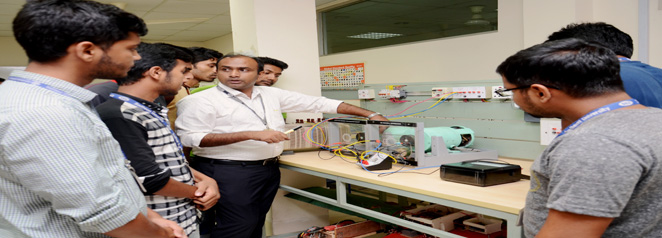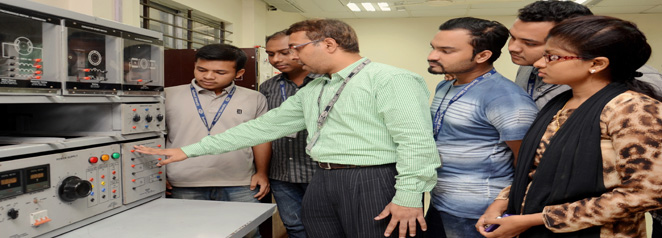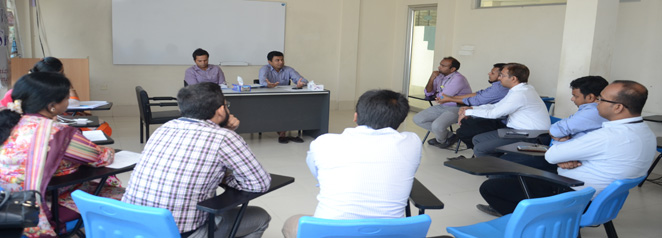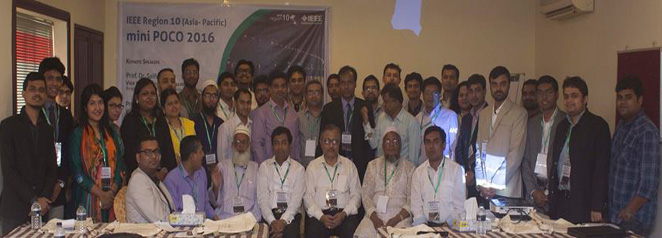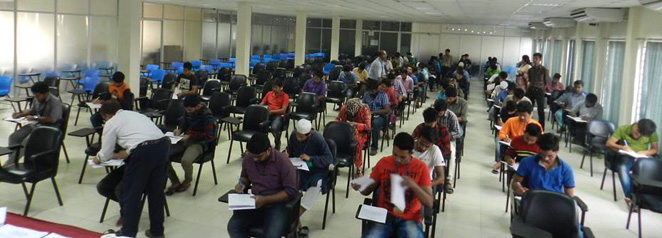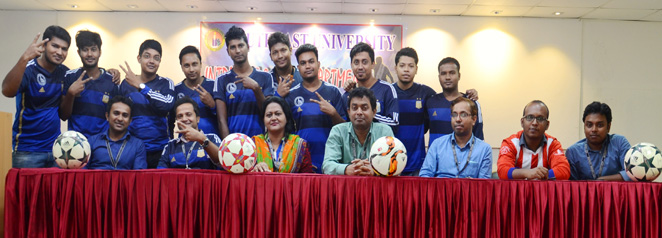
Electrical and Electronic Engineering (EEE) education has entered a transitional phase because the technology is changing every day. The diversity of EEE education is also increasing underscoring its multi-disciplinary nature. All the areas of the electrical and electronic engineering are growing rapidly and new fascinating disciplines of this subject are being created. Thus role of and Electrical and Electronic Engineer has changed significantly. Employers demand an Engineer with excellent communication skills along with skills of multi-disciplinary engineering. Keeping this in mind, the curriculum of the EEE Department has been designed. The main focus of the EEE Department curriculum is on four major areas- power and energy, electronics, communication and computer in the undergraduate curricula. A student is expected to specialize in one of these groups without compromising the fundamental knowledge in EEE. Courses in basic science, mathematics, relevant branch of Engineering including laboratory experience in the use of modern equipment for measurement and design. Education is the humanities, social sciences, ethical principles and management, with special attention to the development of effective written and oral communication skills. Technical Elective coursework that encourages individual interests and provides the opportunity to gain further knowledge in multiple disciplines facilitates the development of problem solving, teamwork, and engineering design skills with the aid of tools, such as, the computer.
Our specifically targeted curriculum will prepare graduates to compete in the high-tech job market on a global scale. In addition to the foreign job opportunities, graduates can avail job opportunities at home, both in public and private sector in the diversified areas, such as, Electrical Power Generation, Transmission and Distribution, Sub-Station Design Firms, Telecommunication Industry, Wireless and Mobile Telecommunication Companies, Satellite Communication Systems, Integrated Circuit (IC) Design, Satellite Television Channels, Telecommunication Switching Systems, Wired and Wireless Networking, Consumer Electronics Appliance Manufacturer, Process Industries, Textile Industries, Computer Industry, Electrical and Electronic Design Firms, Microprocessor and Microcontroller Based Systems, Real Estate Sectors, etc.
Of the five departments under the School of Engineering, Electrical and Electronic Engineering Department is one of the largest departments in terms of the number of faculty members and students. The department of Electrical and Electronic Engineering (EEE) offers the undergraduate academic program of B.Sc. in Electrical and Electronic Engineering or in short B.Sc. in EEE. At present, EEE Department has over 700 undergraduate students and per year student intake is approximately 200. The university authority is giving the attention to attract quality students from home and abroad.
Alumni of this department are serving with good reputation and success in many government and semi-government and non-government organizations, multi-national companies, and educational institutions including universities within the country and abroad. The future for graduates from EEE department looks very promising both at home and abroad because there is shortage of quality graduates and professionally competent engineers in the job market especially, in the field of power and energy, electronics, computer and communication engineering.
The EEE Department is committed to provide the students various modern laboratories equipped with the state-of-the-art equipment, training kits, test and measuring instrument, simulation software packages. The department is also committed to the study and analysis of fundamental as well as applied problems. Teachers and students of EEE department work in solving problems in the conventional and emerging fields.
The EEE Department has recruited well-qualified faculty members graduated from BUET, DU, JU and other foreign universities. They are very much dedicated and committed to our students. They provide enough time and efforts to the students and engage them in teaching, learning and research. The research areas of the faculty members of EEE Department include power, energy, electrical machines, nuclear engineering, semiconductor device modeling and simulation, digital signal processing, power electronics, biomedical electronics, control engineering, optical fiber communication, mobile telecommunication, VLSI and nano technology, electrical engineering education etc. Faculty members of this department take part in active teaching, research activities, consultancy, collaborative research work, curricula and laboratory developments etc.
Besides, this department has several adjunct faculty members from EEE Department of BUET who have national and international reputation and special subject expertise.
The Department of EEE will establish EEE Club and IEEE student branch through which students’ untapped talents and potentials will be explored by conducting various extra- and co-curricular activities, such as, industry visit, seminar, work shop, project fair, quiz contest etc.
In future, Department of EEE will introduce more programs, viz. B.Sc in Electronics and Telecommunication Engineering (ETE) and M. Sc. in Electrical and Electronic Engineering.
The Department of Electrical and Electronic Engineering of Southeast University (SEU) is striving to realize its vision, mission and program educational objectives to place itself on the top position in the country. So far with the available resources and facilities, the Department has succeeded to do so as a result of sincere efforts of its faculty members and students. In this context, cooperation and support from all sectors are the prime factors in attaining such goal. It is expected that the support of different organizations and the alumni of EEE Department will continue and increase in the days ahead so that vision, mission and educational objectives of the EEE Department can be achieved.
Our specifically targeted curriculum will prepare graduates to compete in the high-tech job market on a global scale. In addition to the foreign job opportunities, graduates can avail job opportunities at home, both in public and private sector in the diversified areas, such as, Electrical Power Generation, Transmission and Distribution, Sub-Station Design Firms, Telecommunication Industry, Wireless and Mobile Telecommunication Companies, Satellite Communication Systems, Integrated Circuit (IC) Design, Satellite Television Channels, Telecommunication Switching Systems, Wired and Wireless Networking, Consumer Electronics Appliance Manufacturer, Process Industries, Textile Industries, Computer Industry, Electrical and Electronic Design Firms, Microprocessor and Microcontroller Based Systems, Real Estate Sectors, etc.
Of the five departments under the School of Engineering, Electrical and Electronic Engineering Department is one of the largest departments in terms of the number of faculty members and students. The department of Electrical and Electronic Engineering (EEE) offers the undergraduate academic program of B.Sc. in Electrical and Electronic Engineering or in short B.Sc. in EEE. At present, EEE Department has over 700 undergraduate students and per year student intake is approximately 200. The university authority is giving the attention to attract quality students from home and abroad.
Alumni of this department are serving with good reputation and success in many government and semi-government and non-government organizations, multi-national companies, and educational institutions including universities within the country and abroad. The future for graduates from EEE department looks very promising both at home and abroad because there is shortage of quality graduates and professionally competent engineers in the job market especially, in the field of power and energy, electronics, computer and communication engineering.
The EEE Department is committed to provide the students various modern laboratories equipped with the state-of-the-art equipment, training kits, test and measuring instrument, simulation software packages. The department is also committed to the study and analysis of fundamental as well as applied problems. Teachers and students of EEE department work in solving problems in the conventional and emerging fields.
The EEE Department has recruited well-qualified faculty members graduated from BUET, DU, JU and other foreign universities. They are very much dedicated and committed to our students. They provide enough time and efforts to the students and engage them in teaching, learning and research. The research areas of the faculty members of EEE Department include power, energy, electrical machines, nuclear engineering, semiconductor device modeling and simulation, digital signal processing, power electronics, biomedical electronics, control engineering, optical fiber communication, mobile telecommunication, VLSI and nano technology, electrical engineering education etc. Faculty members of this department take part in active teaching, research activities, consultancy, collaborative research work, curricula and laboratory developments etc.
Besides, this department has several adjunct faculty members from EEE Department of BUET who have national and international reputation and special subject expertise.
The Department of EEE will establish EEE Club and IEEE student branch through which students’ untapped talents and potentials will be explored by conducting various extra- and co-curricular activities, such as, industry visit, seminar, work shop, project fair, quiz contest etc.
In future, Department of EEE will introduce more programs, viz. B.Sc in Electronics and Telecommunication Engineering (ETE) and M. Sc. in Electrical and Electronic Engineering.
The Department of Electrical and Electronic Engineering of Southeast University (SEU) is striving to realize its vision, mission and program educational objectives to place itself on the top position in the country. So far with the available resources and facilities, the Department has succeeded to do so as a result of sincere efforts of its faculty members and students. In this context, cooperation and support from all sectors are the prime factors in attaining such goal. It is expected that the support of different organizations and the alumni of EEE Department will continue and increase in the days ahead so that vision, mission and educational objectives of the EEE Department can be achieved.

